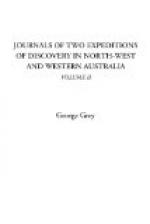The men have also certain war-chants or songs; these they sing as they go walking rapidly to and fro, quivering their spears in order to work themselves up into a passion. The following is a very common one:
Yu-do dan-na,
Nan-do dan-na,
My-eree dan-na,
Goor-doo dan-na,
Boon-gal-la dan-na,
Gonog-o dan-na,
Dow-al dan-na,
Nar-ra dan-na.
etc. etc. etc.
TRANSLATION.
Spear his forehead,
Spear his breast,
Spear his liver,
Spear his heart,
Spear his loins,
Spear his shoulder,
Spear his thigh,
Spear his ribs,
etc. etc. etc.
Thus rapidly enumerating all the parts in which they intend to strike their enemies.
It is very rarely that any remarkable circumstance occurs but songs are composed in order to perpetuate the remembrance of it. For example, when Miago, the first native who ever quitted Perth, was taken away in H.M. surveying vessel Beagle in 1838, the following song was composed by a native and was constantly sung by his mother (at least so she says) during his absence, and it has ever since been a great favourite:
Ship bal win-jal bat-tar-dal gool-an-een,
Ship bal win-jal bat-tar-dal gool-an-een.
etc. etc. etc. etc.
Whither is that lone ship wandering,
Whither is that lone ship wandering,
etc. etc. etc. etc.
Again, on Miago’s safe return, the song given below was composed by a native after he had heard Miago recount his adventures:
Kan-de maar-o, kan-de maar-a-lo,
Tsail-o mar-ra, tsail-o mar-ra-lo.
etc. etc. etc. etc.
Unsteadily shifts the wind-o, unsteadily shifts the
wind-o,
The sails-o handle, the sails-o handle-ho.
I will now add several other songs which are composed in different dialects; these will serve both as examples of their metre and style of poetry and as specimens for the purpose of comparison with the songs of the natives of the other portions of the continent.
Number 1.
One voice:
Djal-lee-lee-na.
Chorus:
Mong-a-da, mong-a-da,
Mong-a-da, mong-a-da,
Mong-a-da, mong-a-da.
One voice:
Eee-dal-lee-na.
Chorus:
Wun-a-da, wun-a-da,
Wun-a-da, wun-a-da,
Wun-a-da, wun-a-da.
etc. etc. etc.
They all join in the chorus of:
Mong-a-da, etc. etc.
Wun-a-da, etc. etc.
And clap their hands in time to the air to which this chorus is sung, so that the effect produced is very good. I am unable to render this song into English.
Number 2.
Dow-al nid-ja kotiay bool-a,
Woor-ar wur-rang-een,
Dow-al nid-ja kotiay bool-a,
Woor-ar wur-rang-een
Dow-al nid-ja kotiay bool-a,
Woor-ar wur-rang-een.




